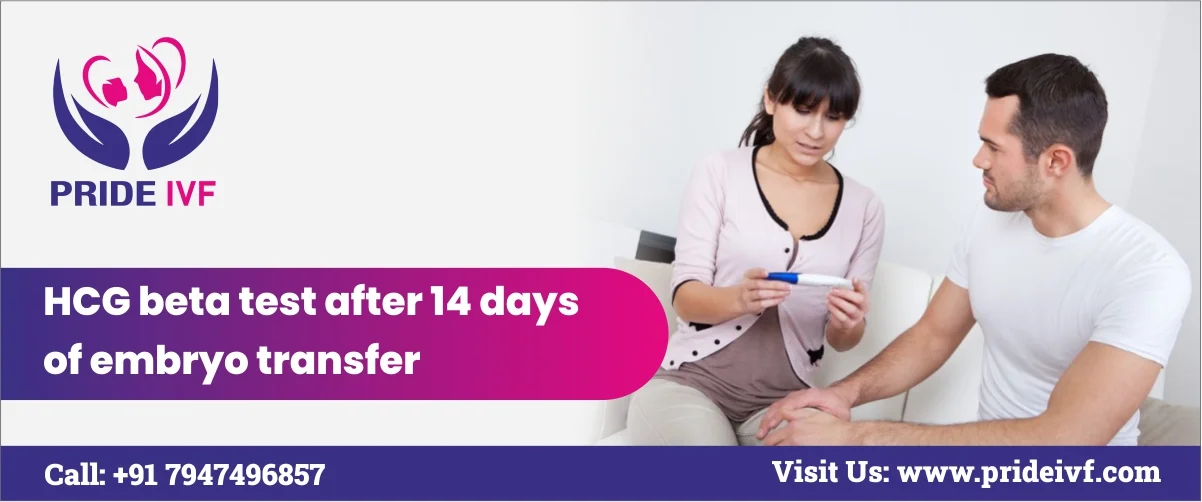There can be a lot of hope and anticipation during the 14-day period following embryo transfer for couples undergoing in vitro fertilization (IVF). The HCG Beta Test After 14 Days of Embryo Transfer, a significant accomplishment that sheds light on the procedure’s success, marks the conclusion of this phase.
Whether you’re waiting for your own HCG beta test results or want to learn more about fertility treatments, this blog encompasses some useful information by the expert medical team of Pride IVF to help you through this crucial time by offering clarity and support.
Come learn about the importance of the HCG beta test and how assisted reproductive technologies affect the process of becoming a parent.
This test not only confirms the presence of a pregnancy but also offers preliminary information about its development and viability. We will explore the details of the HCG beta test, including what it involves, why it is done 14 days after embryo transfer hcg levels, the significance of the results, and how people can deal with the practical and emotional aspects of this crucial phase of their reproductive journey, in this extensive blog.




The HCG Beta Test: What Is It?
The beta human chorionic gonadotropin (HCG) hormone level in the blood measured by the HCG beta test. The placenta secretes HCG soon after the embryo is implanted. Usually, the test carried out 14 days after the embryo transferred, giving the hormone enough time to build up in the bloodstream in the event that implantation has taken place.
The beta HCG blood test offers a quantitative measurement of the hormone, providing a more accurate assessment of pregnancy status than do home pregnancy tests that identify HCG in urine.
Why HCG Beta Test After 14 Days of Embryo Transfer?
The HCG beta test’s schedule is very important. It is usually carried out about 14 days following embryo transfer, since this window of time allows HCG levels to rise considerably in the event that embryo implantation has taken place. This period corresponds to the anticipated window for the implantation of embryos and the development of early pregnancy after in vitro fertilization (IVF) or other assisted reproductive technologies.
Confirming if pregnancy occurs after embryo transfer is one of the main goals of the HCG beta test. A positive result means that the process of becoming pregnant has begun when the embryo successfully implants in the uterine lining. This confirmation is a major turning point for couples undergoing infertility treatments; it validates their efforts and provides comfort and hope.
Healthcare professionals might suggest more testing or procedures in light of the HCG beta test results. To support a healthy pregnancy, this may involve continuing prenatal care, ultrasound scans to visualize the pregnancy and confirm fetal development, and repeat HCG tests to track the doubling time of HCG levels. Also Read: HCG Level After Embryo Transfer in IVF
What Makes the HCG Beta Test Crucial?
- Confirmation of Pregnancy: The successful implantation of the embryo into the uterine lining is indicated by a positive HCG beta test result. For couples battling infertility, studying they are pregnant is a huge turning point in their journey.
- Early Pregnancy Detection: The beta HCG blood test offers a quantitative measurement of the hormone, in contrast to home pregnancy tests that identify HCG in urine. This makes it possible to identify and track pregnancy early on, frequently before any outward signs become apparent.
- Evaluation of Pregnancy Viability: Information about the viability of the pregnancy can be gleaned from the blood HCG level. In the first few weeks of a healthy pregnancy, HCG levels usually double every 48–72 hours. Following up on tests to track HCG trends enables medical professionals to evaluate the condition and course of the pregnancy.
What to Anticipate Both Before and After the Test?
- Blood Draw: A routine blood draw required for the HCG beta test. It’s critical to adhere to any special directions from your doctor about medication or fasting prior to the test.
- Waiting for Results: The results usually not known for several hours or even a day after the blood draw. Although it can be unsettling, this wait is an essential step in the procedure.
- Interpreting Results: A numerical value expressed in milli-international units per milliliter (mIU/mL) is commonly provided as the HCG beta test results. Your doctor will evaluate these findings in light of your unique situation, including the quantity and quality of the embryos you had transferred as well as your past medical records.
- Next Steps: Your healthcare provider may suggest further testing, like repeat HCG tests to track doubling time or an ultrasound scan to visualize the pregnancy and confirm fetal development, based on the results of the HCG beta test. the procedure.




Practical and Emotional Aspects to Consider
- Managing Expectations: Although a successful HCG beta test result is reason for celebration, it’s crucial to keep in mind that there is still work to done. Constant observation and assistance from medical professionals are essential to guaranteeing a safe pregnancy.
- Handling Uncertainty: The process of becoming pregnant can be emotionally taxing, particularly while awaiting the results of an HCG beta test. To get through the emotional ups and downs, turn to family, friends, support groups, or counseling services.
- Honoring Milestones: Any advancement, such as a successful HCG beta test outcome, is a milestone deserving of celebration. Regardless of the outcome, take the time to recognize and treasure these moments.
Moving Forward
Whether the HCG beta test results are negative or positive, it’s crucial to talk with your healthcare provider about what to do next. They will provide advice on keeping an eye on the pregnancy, modifying treatment schedules, or getting ready for upcoming ART cycles.
Before achieving success, ART may require several tries for some individuals and couples. Each cycle brings new insights, adjustments, and opportunities for hope. Recall that no two journeys are alike, and there is no one-size-fits-all strategy.
Helping you in this emotional rollercoaster journey our expert medical team of Pride IVF Centre in Delhi is there to assist you at every possible step.
Conclusion
To sum up, the HCG beta test, which administered 14 days after embryo transfer, is a crucial step in the reproductive treatment process. It’s a time of hope, excitement, and occasionally disappointment.
Through comprehension of the procedure, emotional readiness, and assistance seeking, individuals and couples can effectively navigate this difficult yet optimistic stage with perseverance and fortitude.
It provides vital information for tracking the health of the fetus in the early stages of pregnancy in addition to confirming the success of embryo implantation. In the process of using assisted reproductive technologies to become a parent, this test is a significant advancement. To get through the emotional ups and downs, turn to family, friends, support groups, or counseling services.
Keep in mind to give self-care and nurturing your emotional well-being first priority, regardless of the test results. Although starting a family can be a challenging journey, many people succeed in realizing their dream of parenthood with persistence, support, and medical professionals’ advice.
FAQs
Q) What is the HCG beta test, and why is it done after 14 days of embryo transfer?
Human chorionic gonadotropin (HCG), which produced by the placenta following embryo implantation, measured by the HCG beta test. The procedure usually carried out 14 days following the transfer of embryos in order to verify pregnancy and track its development.
Q) How accurate is the HCG beta test in confirming pregnancy?
After embryo transfer, the HCG beta test has a very high accuracy rate for confirming pregnancy. A positive result suggests that embryo implantation has most likely taken place, but more testing and observation frequently advised to determine the viability of the pregnancy.
Q) What are the normal levels of HCG beta after a 14-day embryo transfer?
Depending on a variety of factors, including the quantity and quality of embryos transferred as well as the mother’s health, normal HCG beta levels can vary greatly. Generally speaking, HCG levels above a particular threshold—for example, 25–50 mIU/mL— considered to indicative of pregnancy.
Q) How soon following a positive beta test should HCG levels rise?
HCG levels in the early weeks of a healthy pregnancy should approximately double every 48–72 hours. This steady ascent suggests healthy fetal growth and placental development.
Q) What necessary steps should take place if the results of an HCG beta test are positive?
Healthcare professionals may suggest further testing in the event of a positive result from an HCG beta test, such as repeat HCG tests to track the doubling time or an ultrasound scan to see the pregnancy and validate fetal development. Planning for prenatal care usually comes next to ensure a safe pregnancy.
Q) While awaiting the results of the HCG beta test, how can I deal with my anxiety?
It can be stressful to wait for the HCG beta test results. Anxiety can controlled during this waiting period by practicing relaxation techniques, asking family members or support groups for assistance, and remaining informed about the procedure.




